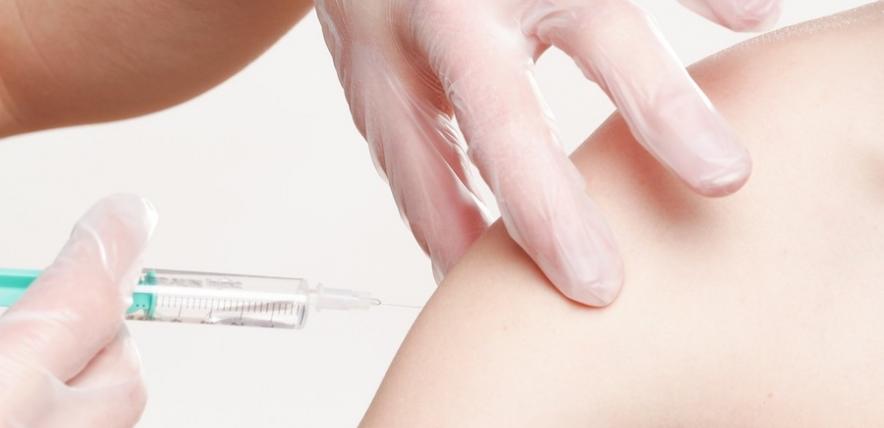Vaccination programmes have helped to eradicate some of the world’s most fatal illnesses, and most parents understand the importance of immunising their children against illness.
Now medical researchers have discovered a further reason to ensure that vaccinations are administered and kept up to date.
They believe that babies and toddlers who receive the required vaccinations and development checks are less likely to be admitted to hospital with serious health conditions during early childhood.
The finding comes from the largest ever analysis looking at the links between infant vaccinations and NHS development checks in primary care, and emergency hospital admissions.
The study, by researchers from Imperial College London, tracked more than 300,000 in England from birth for 13 years from 2000 to 2013. They concluded that as many as 13,500 children a year in England may be missing out on vaccines, and some 83,000 may be missing development checks.
Fewer hospital visits for vaccinated children
The researchers, from Imperial’s School of Public Health, found that infants who did not receive their vaccinations were twice as likely to be an emergency hospital admission than children who received their vaccinations.
Children in the UK receive vaccinations between the ages of 8 weeks and 13 years old, protecting them against a range of illnesses including meningitis, measles and whooping cough.
Children are also invited for NHS health and development checks in their first few days of life, then at around two months old, one year old and two years old. The checks test for several potential health issues including any problems with growth, hearing and vision.
While young children usually have a one in four risk of being admitted to hospital in their first year of life, the research team revealed that for infants who do not receive their vaccinations, this risk increases to one in two.
The study, funded by the National Institute of Health Research, also found that pre-school children who did not complete their vaccinations were six times as likely to be admitted to hospital with a vaccine-preventable infectious illness such as measles.
Infants who missed out on health and development checks, in which general practitioners or health visitors assess healthy mental and physical development - were over four and a half times as likely to end up in hospital.
The study also revealed that children whose vaccinations were delayed also had a higher risk of an emergency hospital admission in their childhood years.
Professor Sonia Saxena, the lead author of the research from Imperial’s School of Public Health, said: “Despite the wealth of evidence for vaccination in driving down serious illness and preventable deaths in children, the benefit of vaccines is still disputed in some sectors of society. This study shows getting your child vaccinated safeguards their future health against the risk of preventable hospital admission. And it prevents not just against infectious illness, but against conditions that can get worse when children are exposed to infection.”
Higher risk of infection
The research team, which followed children from a representative sample of 363 GP practices across England, said the most common reason for hospital admissions was an infectious illness, which was responsible for more than a third of admissions overall.
Children who had a chronic condition, such as asthma, diabetes or epilepsy, were at particularly high risk of an emergency hospital admission if they missed out on vaccinations or development checks. For instance, children with asthma had a fivefold risk if they missed checks and vaccinations, while for children with epilepsy the risk was elevenfold.
The study also revealed 98 per cent of all infants studied were fully vaccinated, and 87 per cent had received developmental checks. Further analysis showed children who didn’t receive vaccinations or developmental checks were more likely to live in deprived areas, have a teenage mother, or be first born.
Dr Dougal Hargreaves, who was part of the research team added: “Children’s health in the UK lags behind other Western European countries, and emergency hospital admissions for children have been steadily rising over recent years. Ensuring as many children as possible receive vaccinations and development checks may help combat this rise and improve the health of children and young people.”
The following vaccinations are routinely offered to all UK children free of charge.
Your GP surgery will normally inform you when you need to bring your child in.
8 weeks
6-in-1 vaccine, given as a single jab containing vaccines to protect against six separate diseases: diphtheria; tetanus; whooping cough (pertussis); polio; Haemophilus influenzae type b, known as Hib, a bacterial infection that can cause severe pneumonia or meningitis in young children; and hepatitis B
Pneumococcal (PCV) vaccine
Rotavirus vaccine
MenB vaccine
12 weeks
6-in-1 vaccine, second dose
Rotavirus vaccine, second dose
16 weeks
6-in-1 vaccine, third dose
Pneumococcal (PCV) vaccine, second dose
MenB vaccine second dose
1 year
Hib/MenC vaccine, given as a single jab containing vaccines against meningitis C (first dose) and Hib (fourth dose)
Measles, mumps and rubella (MMR) vaccine, given as a single jab
Pneumococcal (PCV) vaccine, third dose
MenB vaccine, third dose
2 to 9 years (including children in reception class and school years 1 to 5)
Children's flu vaccine (annual)
3 years and 4 months
Measles, mumps and rubella (MMR) vaccine, second dose
4-in-1 pre-school booster, given as a single jab containing vaccines against: diphtheria, tetanus, whooping cough (pertussis) and polio
Further reading:
The study: Impact of preventive primary care on children’s unplanned hospital admissions







